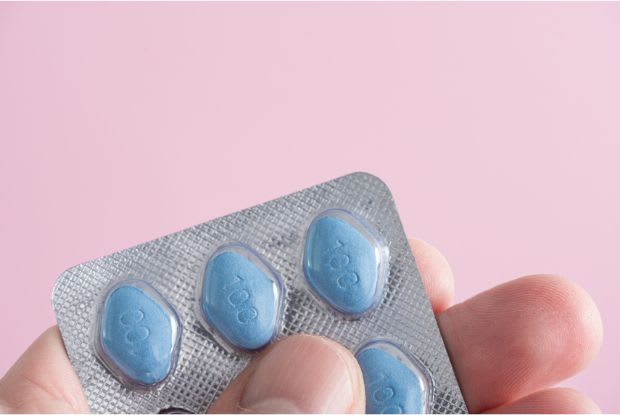The Relationship Between Diabetes and Erectile Dysfunction
The Relationship Between Diabetes and Erectile Dysfunction
Table of Contents
I. What is Erectile Dysfunction (ED)?
II. The Link Between ED and Diabetes
III. How to Treat Diabetes-Related ED
Erectile dysfunction (ED) is a common complication for men with diabetes, impacting an estimated 34% to 45% of diabetic men. 1 The longer diabetes goes uncontrolled and the more complications it causes, the more likely ED becomes. However, getting blood sugar under control can help you avoid the nerve and vascular damage that contributes to ED. The key is early intervention.
This article explains the connection between diabetes and ED and how to treat ED caused by diabetes. You'll learn why diabetes makes ED more likely, how improving blood sugar control can help, and what treatments are available.
What is Erectile Dysfunction (ED)?

Erectile dysfunction (ED) is when a man has ongoing trouble getting or keeping an erection firm enough for sexual intercourse. Though the occasional issue in the bedroom is normal, ED that happens regularly is not. 2
ED can occur due to a few reasons:
- Limited blood flow to the penis
- The penile nerves are damaged
- Stress and emotional issues
- An early warning sign of more serious health issues like atherosclerosis, heart disease, high blood pressure, or diabetes. 2
Beyond the physical symptoms, ED can also lead to lowered self-esteem, depression, and relationship distress. Determining the cause of ED is important for proper treatment. 2
The Link Between ED and Diabetes
Erectile dysfunction (ED) is a common problem for men with diabetes:
- The prevalence of ED is three times higher in men with diabetes than without.
- Men with diabetes experience ED at an earlier age.
- Poor control of diabetes and its complications (such as nerve and vascular damage) can increase the likelihood of ED. 3
Type 2 diabetes is a condition where the body struggles to regulate the amount of blood glucose (blood sugar) in the bloodstream. Normally, insulin controls the amount of glucose in the blood, but when the body can't produce enough insulin, or if the body becomes resistant to it, diabetes can develop. 4
Over time, high blood sugar can damage blood vessels and nerves throughout the body, including those involved in the erection process. Erections require healthy blood flow and nerve stimulation, so damage to either can contribute to ED. For most diabetic men, the onset of ED is gradual, unlike erection problems caused by performance anxiety or emotional issues, which tend to appear suddenly. 4
Two factors that often contribute to ED in diabetic men are:
- High blood sugar: Elevated blood glucose levels can damage blood vessels and nerves involved in arousal and erection. Because diabetes may cause abnormal functioning of the blood vessel lining, blood flow to the penis may be impaired, preventing erection.
- Low testosterone: Insulin resistance, common in diabetes, can also lower levels of sex hormone-binding globulin (SHBG). With less SHBG, there is less testosterone available in the body. Low testosterone can reduce sex drive, cause ED, decrease muscle mass, lead to depression, and lower energy levels. 1
How to Treat Diabetes-Related ED

Maintaining a healthy lifestyle is essential for reducing the risk of developing ED as a complication of type 2 diabetes. One crucial aspect is monitoring and controlling blood glucose levels. 4 This can be achieved through a combination of positive habits:
- Engaging in regular exercise
- Adopting a healthy diet
- Prioritizing sleep
- Limiting alcohol intake
- Managing stress effectively
- Quitting smoking 4
If ED has already manifested due to diabetes, consult a healthcare provider to explore medication options that can help address the issue. Some commonly prescribed medications include:
- PDE5 inhibitors like Viagra and Cialis. These medications prevent the chemical that usually reverses erections, allowing you to maintain an erection longer. 1
- Weight loss medications such as semaglutide and tirzepatide. Strong evidence shows that weight loss is the best way to control diabetes. Losing weight decreases fat in the liver and pancreas so they can properly regulate blood sugar again. 5
Managing diabetes can stop ED from worsening, but nerve damage sometimes prevents symptoms from improving. 6 In these cases, your doctor may recommend the following treatments:
- Injection therapy involves injecting the penis with a needle to cause an erection. No more than three injections are allowed per week.
- Penile implants are surgically inserted devices that enable erections. After surgery, erections look and feel natural without affecting sensation. Implants replace erectile tissue that no longer works. On average, penile implants last 12 to 15 years. 6
Conclusion
Diabetes and erectile dysfunction often go hand in hand. This is because high blood sugar levels associated with diabetes can damage the nerves and blood vessels involved in getting and maintaining an erection. When these nerves and blood vessels are impaired, it becomes difficult to achieve and sustain an erection suitable for intercourse.
The most effective way to prevent or control erectile dysfunction caused by diabetes is to keep your blood sugar levels under control. Work with your doctor to find a treatment plan that keeps your A1C at recommended levels. Losing excess weight can also help improve blood sugar control and reduce the impact of diabetes on sexual function.
References
- Diabetes Canada Chapter 33 sexual dysfunction and hypogonadism in men with diabetes
- Urology Care Foundation Erectile dysfunction (ED)
- Boston University School of Medicine Diabetes and ED
- Urology Center of Florida Can type 2 diabetes cause erectile dysfunction?
- Diabetes UK What is type 2 diabetes remission?
- University of Utah Diabetes and ED: Symptoms, treatment
